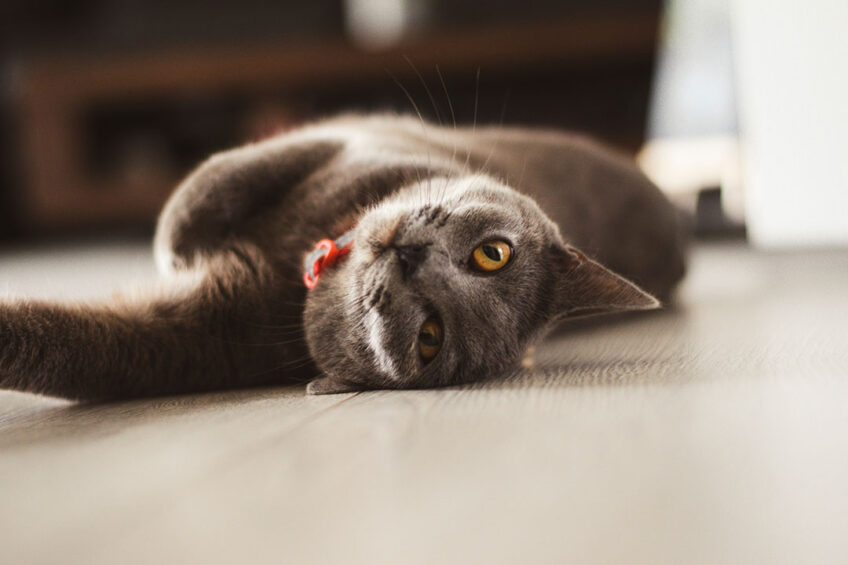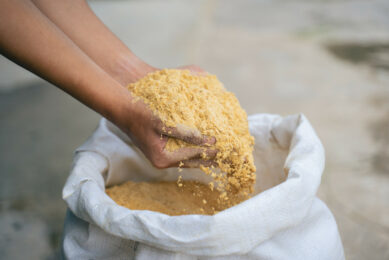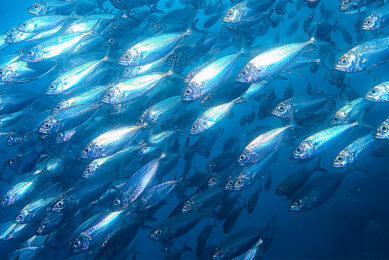The probiotic benefits of duck acid extract in cats

In a new study published in the Journal of Applied Sciences, researchers found that duck bile acid extract modulates fat metabolism and induces probiotic effects, improving gut health in cats. When it comes to weight management, the additive could be useful as it reduces the weight of cats.
Studies show that bile acids have been widely used in feeding livestock in recent years and could be a good supplement for other animals. Bile acids are important metabolites in both human and cat fat metabolism as they have emulsifying properties that enhance the digestion of fats and act as signals in the fat metabolism process. Besides the benefits on animal performance and nutrient digestibility and absorption, bile acids have been found to have a close relationship with the gut microbiome. In addition, as important signals in metabolic pathways, bile acids modulate many diseases such as irritable bowel syndrome, liver diseases and obesity. Previous studies show that bile acids enhance the breakdown and absorption of lipids and spare live function as they aid the excretion of waste substances such as bilirubin. In the current study, researchers chose duck bile acid extract to investigate the benefits of bile acids in cats; duck bile acid extract was relatively easy to acquire and the cost was appropriate for its application, so they recommended its use for further similar studies.
Trial: Nutrient digestibility & cut health of cats
The researchers investigated how duck bile acid extract influences the nutrient digestibility and gut health of cats, measuring faecal microbiota, short-chain fatty acids (SCFAs), fat digestibility and blood biochemical indices. British shorthair cats weighing 3 kg were used in the test. A within-subject study design was used in this test with each cat representing its control to exclude the factors of between-subject variation. For 28 days, exogenous duck bile acid extract (50 mg/kg body weight) was added to the food of each cat, comparing measurements between day 0 and day 28.
Improving gut health
After supplementation of duck bile acid extract, the abundance of Actinobacteria increased considerably, and the abundance of Firmicutes and Proteobacteria decreased. At the genus level, the abundance of Bifidobacterium, Lactobacillus and Megasphaera, the core probiotics in the gut, was improved after using the bile acid product. The increase in beneficial bacteria in the gut following feeding the extract indicated that bile acids improve gut health by modulating the gut microbiota. According to the researchers, the mechanism was probably that Bifidobacterium
spp. could produce the bile salt hydrolase and was bile-metabolising as reviewed in other similar studies. The study also showed that bile acid extract inhibited the gastric disease-causing Helicobacter pylori.
Short-chain fatty acids (SCFAs) are closely related to gut microflora and have important nutrient-modulating effects, leading to the supply of energy for intestinal epithelial cells and imparting health benefits to animals.
In this study, researchers investigated the extract’s influence on 4 SCFAs:
- butyric acid,
- acetic acid,
- propionic acid,
- and isovaleric acid.
Except for isovaleric acid, the extract improved the concentration of all the SCFAs, which was related to the increase of species producing SCFAs such as Bifidobacteria as previous studies show that Bifidobacteria modulate the receptor GPR43 of short-chain fatty acids.
Fat is an important energy source for cats
Research shows that fat is an important energy source for cats, and its digestibility should be sufficiently high to meet the energy requirements of cats. Fats also act as transport molecules, and they help conduct nerve impulses. For example, essential omega-3 and omega-6 fatty acids are shown to be important for skin and coat health, wound healing and inflammation. In the current study, the supplementation with duck bile acid extract improved fat digestibility by 5.7%. Similarly, proper digestion of starch is required to further provide the body with energy, making the enzyme amylase an important catalyst. As mentioned by the researchers who carried out the current study, cats cannot produce sufficient amylase through saliva; thus, the production of amylase could probably be reflected by the function of the pancreas. In this research, the amylase activity was increased greatly after using the extract, which meant that the bile acid extract could improve the pancreas function indirectly, resulting in better starch digestion and energy provision.
Cholesterol significantly reduced
According to the Association of American Feed Control Officials (AAFCO) recommendations, the minimum requirement for fat content in complete cat food is 9% on a dry matter basis to meet the nutritional needs of adult cats (AAFCO, 2014). Although the fat content was not present in the current study, researchers highlighted the fact that the diet had high protein and fat content, which could lead to elevated concentrations of lipids or fats within the blood, increasing the chance of vascular diseases. In this research, the cholesterol was significantly reduced after using the extract, showing that the extract could have a beneficial effect by modulating fat metabolism.
Potential weight management additive
On the other hand, obesity has become a prevalent health issue among domestic cats. Although the causes of feline obesity are multifaceted, diet plays an important role. Studies show that many commercial cat foods contain high fat during the maintenance phase, resulting in a positive energy balance that usually leads to obesity. Obesity in feline nutrition is also associated with alterations in gut microbiota, inflammation and the development of diabetes. Nutritional additives that reduce weight could be a key remedy for weight management or obesity in cats. In the current study, the addition of the extract resulted in a reduction in weight of approximately 2%. Drawing from previous research work, it can also be said that reducing dietary fat levels and restricting calorie density are effective strategies for managing obesity in cats.
Concluding remarks
The researchers concluded that duck bile acids could modulate fat metabolism and increase probiotics in the gut of cats and could also be a good feed additive to reduce weight and improve gut health for cats. The positive effect on blood biochemical indices was highlighted, indicating the potential beneficial use of duck bile acid extract in cat clinical practice.
“The research focused mainly on explaining the result, and more research on the mechanism will be needed in future. In addition, various concentrations need to be studied to ensure that the best inclusion levels of bile acid extract are established,” they said.
The original article was written by Bing Han, Peng Zhao, Shukun Liang, Zhenlong Wang, Hui Tao, Xiumin Wang, Jie Liu and Jinquan Wang. 2023. The Effect of Duck Bile Acid Extract on the Fecal Microbiota, Short Chain Fatty Acids, Fat Digestibility and Blood Biochemical Indices in Cats. Applied Sciences, 13: 9713.











